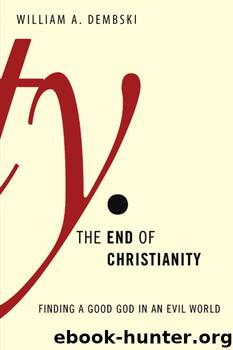The End of Christianity by William A. Dembski

Author:William A. Dembski [Dembski, William A.]
Language: eng
Format: epub
Tags: Religion, Christian Theology, Apologetics
ISBN: 9781433669217
Google: ng25AwAAQBAJ
Amazon: B002SV36ZA
Barnesnoble: B002SV36ZA
Publisher: B&H Publishing Group
Published: 2009-11-01T00:00:00+00:00
PART IV
RETROACTIVE EFFECTS OF THE FALL
Sixteen
CHRONOS AND KAIROS
To see how the Fall can affect not only the future but also the past, we need to understand how God acts across time, or transtemporally. Scripture teaches that creation is a progression of effected words spoken by God.1 In creating the world, God says one thing, then another, building on what he just said, and so on. This progression has an inherent logic because the effect of one word depends logically on the prior effect of others (e.g., the creation of fish presupposes the creation of water).
This logic has traditionally been called the order of creation.2 We can think of the order of creation as history from the vantage of divine intention and action. In this top-down view of history, certain divine intentions and actions are logically prior to others. Logical priority rather than temporal priority defines history for God. History from the divine perspective therefore contrasts with our ordinary, bottom-up view of history, which we may refer to as natural history.3 Natural history confines history to space and time and sees the logic of history as determined by physical causality rather than by divine intention.
This distinction between the order of creation and natural history reflects a fundamental distinction in the nature of time. In English, we have just one word for time. But the Greek of the New Testament had two: chronos and kairos.4 According to Arndt and Gingrich’s standard lexicon of New Testament Greek, chronos denotes mere duration whereas kairos denotes time with a purpose (especially a divine purpose). Thus, in defining kairos, Arndt and Gingrich characterize it as “a welcome time,” “the right, proper, favorable time,” and “the time of crisis.”5 The special role of kairos in fulfilling divine purposes is reflected in the liturgy of the Eastern Orthodox Church, which begins with the deacon calling to the congregation, “It is time [kairos] for the Lord to act,” signifying that in worship temporality and eternity intersect.6
Paul Tillich highlighted the distinction between chronos and kairos in his theology. In his lectures on the history of Christian thought, he remarked,
Download
This site does not store any files on its server. We only index and link to content provided by other sites. Please contact the content providers to delete copyright contents if any and email us, we'll remove relevant links or contents immediately.
The Lost Art of Listening by Michael P. Nichols(7487)
Why I Am Not A Calvinist by Dr. Peter S. Ruckman(4144)
The Rosicrucians by Christopher McIntosh(3508)
Wicca: a guide for the solitary practitioner by Scott Cunningham(3163)
Signature in the Cell: DNA and the Evidence for Intelligent Design by Stephen C. Meyer(3124)
Real Sex by Lauren F. Winner(3006)
The Holy Spirit by Billy Graham(2942)
To Light a Sacred Flame by Silver RavenWolf(2813)
The End of Faith by Sam Harris(2729)
The Gnostic Gospels by Pagels Elaine(2522)
Waking Up by Sam Harris(2453)
Nine Parts of Desire by Geraldine Brooks(2355)
Jesus by Paul Johnson(2351)
Devil, The by Almond Philip C(2324)
The God delusion by Richard Dawkins(2296)
Heavens on Earth by Michael Shermer(2277)
Kundalini by Gopi Krishna(2179)
Chosen by God by R. C. Sproul(2159)
The Nature of Consciousness by Rupert Spira(2094)
